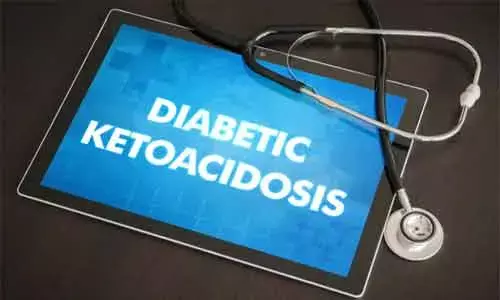- Home
- Medical news & Guidelines
- Anesthesiology
- Cardiology and CTVS
- Critical Care
- Dentistry
- Dermatology
- Diabetes and Endocrinology
- ENT
- Gastroenterology
- Medicine
- Nephrology
- Neurology
- Obstretics-Gynaecology
- Oncology
- Ophthalmology
- Orthopaedics
- Pediatrics-Neonatology
- Psychiatry
- Pulmonology
- Radiology
- Surgery
- Urology
- Laboratory Medicine
- Diet
- Nursing
- Paramedical
- Physiotherapy
- Health news
- Fact Check
- Bone Health Fact Check
- Brain Health Fact Check
- Cancer Related Fact Check
- Child Care Fact Check
- Dental and oral health fact check
- Diabetes and metabolic health fact check
- Diet and Nutrition Fact Check
- Eye and ENT Care Fact Check
- Fitness fact check
- Gut health fact check
- Heart health fact check
- Kidney health fact check
- Medical education fact check
- Men's health fact check
- Respiratory fact check
- Skin and hair care fact check
- Vaccine and Immunization fact check
- Women's health fact check
- AYUSH
- State News
- Andaman and Nicobar Islands
- Andhra Pradesh
- Arunachal Pradesh
- Assam
- Bihar
- Chandigarh
- Chattisgarh
- Dadra and Nagar Haveli
- Daman and Diu
- Delhi
- Goa
- Gujarat
- Haryana
- Himachal Pradesh
- Jammu & Kashmir
- Jharkhand
- Karnataka
- Kerala
- Ladakh
- Lakshadweep
- Madhya Pradesh
- Maharashtra
- Manipur
- Meghalaya
- Mizoram
- Nagaland
- Odisha
- Puducherry
- Punjab
- Rajasthan
- Sikkim
- Tamil Nadu
- Telangana
- Tripura
- Uttar Pradesh
- Uttrakhand
- West Bengal
- Medical Education
- Industry
FreeStyle Libre use may significantly reduce ketoacidosis Rate in Diabetes

Reduced hospitalization rates among people with low self-monitoring of blood glucose (SMBG) are especially pronounced reveals a study presented at American Diabetic Association meeting.
Chicago -- People using Abbott's FreeStyle Libre, a sensor-based glucose monitoring system, experienced a considerable decrease in ketoacidosis-related hospitalizations—52% for type 1 diabetes and 47% for type 2 diabetes—according to the study titled "Dramatic Drop in Ketoacidosis Rate after FreeStyle Libre System Initiation in Type 1 and Type 2 Diabetes in France, Especially in People with Low Self-Monitoring of Blood Glucose (SMBG): A Nationwide Study," presented today at the American Diabetes Association's® (ADA's) 80th Virtual Scientific Sessions.
The trial, known as the "RELIEF" study, is the largest study to date on the impact of the FreeStyle Libre system on rates of hospitalization for diabetic ketoacidosis (DKA), a life-threatening condition that is generally preventable through close glucose monitoring.
Researchers retrospectively analyzed DKA rates using ICD-10 codes (E10.1, E11.1), on the French national claims database, among 33,203 people with type 1 diabetes (T1D) and 40,955 people with type 2 diabetes (T2D) who used the FreeStyle Libre system between August 1, 2017 and December 31, 2017. DKA rates were recorded in the year prior to the first FreeStyle Libre sensor claim and in the year after.
The data analysis revealed:
Overall, yearly DKA rates were reduced after FreeStyle Libre system initiation by 52% for patients with T1D and 47% for patients with T2D.
Results were most marked in the sub-population of patients who did not use self-monitoring blood glucose testing (SMBG) in the year prior to FreeStyle Libre system use (60% reduction for patients with T1D and 51% reduction for patients with T2D).
People with the most regular use of SMBG testing (more than five blood glucose test strips reimbursed per day) also experienced marked reductions in hospitalizations (59% for T1D and 52% for T2D).
A reduction in hospitalization rates for DKA was observed among patients treated with multiple daily injections, as well as patients who used continuous insulin infusion.
"This was a dramatic reduction in ketoacidosis-related hospitalization rates among patients with both type 1 and type 2 diabetes—especially among people who previously had very low self-monitoring of blood glucose—and supports the use of intermittently scanned continuous glucose monitoring systems like the FreeStyle Libre for individuals who are at risk for diabetes related complications such as diabetic ketoacidosis," said lead study author Ronan Roussel, MD, PhD, chief of the endocrinology, diabetes, and nutrition department at Hôpital Bichat, Fédération de Diabétologie, AP-HP, Paris, France. "It is plausible that the use of the FreeStyle Libre system allowed people to detect and limit persistent hyperglycemia, and subsequently prevent ketoacidosis. Although preventing ketoacidosis has traditionally relied on intensive self-monitoring of blood glucose, there is growing literature that shows this has not helped reduce the overall incidence of diabetic ketoacidosis. The positive results of this study demonstrate that intermittently scanned continuous glucose monitoring may have significant implications for patient-centered clinical care and, given the increased burden of ketoacidosis on healthcare utilization and expenditure, it may have a positive impact on long-term economic health outcomes."
Research presentation details:
Abstract: 68-OR
Dr Kamal Kant Kohli-MBBS, DTCD- a chest specialist with more than 30 years of practice and a flair for writing clinical articles, Dr Kamal Kant Kohli joined Medical Dialogues as a Chief Editor of Medical News. Besides writing articles, as an editor, he proofreads and verifies all the medical content published on Medical Dialogues including those coming from journals, studies,medical conferences,guidelines etc. Email: drkohli@medicaldialogues.in. Contact no. 011-43720751


